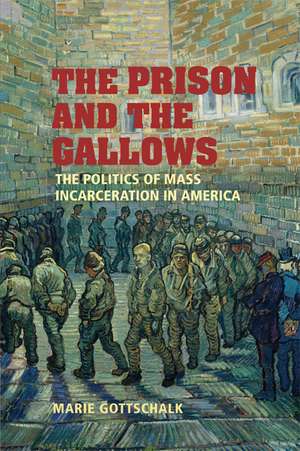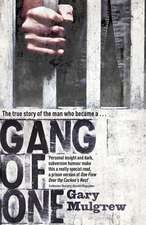The Prison and the Gallows: The Politics of Mass Incarceration in America: Cambridge Studies in Criminology
Autor Marie Gottschalken Limba Engleză Paperback – 18 iun 2006
| Toate formatele și edițiile | Preț | Express |
|---|---|---|
| Paperback (1) | 236.42 lei 3-5 săpt. | |
| Cambridge University Press – 18 iun 2006 | 236.42 lei 3-5 săpt. | |
| Hardback (1) | 618.88 lei 6-8 săpt. | |
| Cambridge University Press – 18 iun 2006 | 618.88 lei 6-8 săpt. |
Din seria Cambridge Studies in Criminology
-
 Preț: 327.00 lei
Preț: 327.00 lei -
 Preț: 288.42 lei
Preț: 288.42 lei - 11%
 Preț: 693.51 lei
Preț: 693.51 lei -
 Preț: 374.88 lei
Preț: 374.88 lei -
 Preț: 282.87 lei
Preț: 282.87 lei -
 Preț: 324.70 lei
Preț: 324.70 lei -
 Preț: 244.90 lei
Preț: 244.90 lei -
 Preț: 295.08 lei
Preț: 295.08 lei -
 Preț: 242.58 lei
Preț: 242.58 lei -
 Preț: 319.99 lei
Preț: 319.99 lei -
 Preț: 317.78 lei
Preț: 317.78 lei -
 Preț: 244.31 lei
Preț: 244.31 lei -
 Preț: 274.85 lei
Preț: 274.85 lei -
 Preț: 420.69 lei
Preț: 420.69 lei -
 Preț: 315.54 lei
Preț: 315.54 lei -
 Preț: 371.06 lei
Preț: 371.06 lei -
 Preț: 281.30 lei
Preț: 281.30 lei -
 Preț: 339.86 lei
Preț: 339.86 lei -
 Preț: 311.99 lei
Preț: 311.99 lei -
 Preț: 375.68 lei
Preț: 375.68 lei -
 Preț: 248.18 lei
Preț: 248.18 lei -
 Preț: 342.09 lei
Preț: 342.09 lei -
 Preț: 432.55 lei
Preț: 432.55 lei -
 Preț: 333.68 lei
Preț: 333.68 lei - 14%
 Preț: 873.52 lei
Preț: 873.52 lei -
 Preț: 221.17 lei
Preț: 221.17 lei -
 Preț: 322.62 lei
Preț: 322.62 lei -
 Preț: 321.31 lei
Preț: 321.31 lei -
 Preț: 290.54 lei
Preț: 290.54 lei -
 Preț: 294.90 lei
Preț: 294.90 lei -
 Preț: 407.72 lei
Preț: 407.72 lei -
 Preț: 288.54 lei
Preț: 288.54 lei -
 Preț: 279.98 lei
Preț: 279.98 lei -
 Preț: 284.78 lei
Preț: 284.78 lei
Preț: 236.42 lei
Nou
Puncte Express: 355
Preț estimativ în valută:
45.24€ • 48.38$ • 37.72£
45.24€ • 48.38$ • 37.72£
Carte disponibilă
Livrare economică 27 martie-10 aprilie
Preluare comenzi: 021 569.72.76
Specificații
ISBN-13: 9780521682916
ISBN-10: 0521682916
Pagini: 468
Ilustrații: 1 table
Dimensiuni: 152 x 229 x 26 mm
Greutate: 0.7 kg
Editura: Cambridge University Press
Colecția Cambridge University Press
Seria Cambridge Studies in Criminology
Locul publicării:New York, United States
ISBN-10: 0521682916
Pagini: 468
Ilustrații: 1 table
Dimensiuni: 152 x 229 x 26 mm
Greutate: 0.7 kg
Editura: Cambridge University Press
Colecția Cambridge University Press
Seria Cambridge Studies in Criminology
Locul publicării:New York, United States
Cuprins
1. The prison and the gallows: the construction of the carceral state in America; 2. Law, order, and alternative explanations; 3. Unlocking the past: the nationalization and politicization of law and order; 4. The carceral state and the welfare state: the comparative politics of victims; 5. Not the usual suspects: feminists, women's groups, and the anti-rape movement; 6. The battered women's movement and the development of penal policy; 7. From rights to revolution: prison activism and penal policy; 8. Capital punishment, the courts, and the early origins of the carceral state, 1920s–60s; 9. The power to punish: the political development of capital punishment, 1972 to today; 10. Conclusion: whither the carceral state.
Recenzii
"The Prison and the Gallows brings politics (both the state and organized interests) back into a discussion that has been preoccupied with society (modernity) and with social structures (race and the economy). Gottschalk does not, however, tell a politician or partisanship story, the longstanding familiar one of running on crime and submitting to the pressures of electoral realignment. Rather her extraordinarily original and paradoxical story is the much more challenging one about the very most reformist movements in society that might have, but did not, resist or redirect carceral expansion. This is an exquisitely-written book and one which meets the highest standards of academic scholarship." --Mary Fainsod Katzenstein, Cornell University
"The Prison and the Gallows provides important insight into the perplexing question of how the United States came to embark upon a policy of mass incarceration over the past several decades. Marie Gottschalk documents how a particular set of political and historical conditions intersected with the agendas of both liberal and conservative interest groups to produce an outcome that is unique by world standards. Her analysis suggests that these developments were not inevitable, an important lesson to understand if we are to develop strategies for reversing these disastrous policies." -- Marc Mauer, Executive Director, The Sentencing Project; author, Race to Incarcerate
"One of the most important books I've read in years. Marie Gottschalk shows --in vivid and mournful detail-- how Americans lock one another up at unprecedented rates. The Prison and the Gallows provides the big picture, analytic nuance, historical context, comparative evidence, policy proposals, and a touch of outrage. Splendid scholarship presented with flair and passion." -- James Morone, author, Hellfire Nation: The Politics of Sin in American History
"Marie Gottschalk's multilayered account is thought-provoking and convincingly argued. It unites historical observations with the analysis of current situations, it provides both a big picture and nuanced analysis, and it helps us to understand how institutional and political constellations, familiar in the explanation of the politics of mass incarceration in America, went hand in hand with the work of pressure groups and popular movements usually not associated with today's crime and punishment policy." -Juergen Martschukat, H-Law
"Marie Gottschalk, a political scientist at the University of Pennsylvania who previously has written about the welfare state and health care, offers an extraordinarily ambitious and comprehensive analysis using history and political science to try to explain why, over the last three decades, the United States has built a carceral state that is unrivaled in size among Western countries...This useful book has many excellent features that should stimulate needed discussion about America's penal policies and the often unintended consequences of social reform." - Scott Christianson, Sand Lake, New York The Journal of American History
"This is an important, carefully argued, and richly detailed analysis that deserves wide attention. As Gottschalk emphasizes in a largely prescriptive concluding chapter, any efforts to reverse current penal policy should be clear about its origins." - Charles Williams, University of Washington
"The Prison and the Gallows provides important insight into the perplexing question of how the United States came to embark upon a policy of mass incarceration over the past several decades. Marie Gottschalk documents how a particular set of political and historical conditions intersected with the agendas of both liberal and conservative interest groups to produce an outcome that is unique by world standards. Her analysis suggests that these developments were not inevitable, an important lesson to understand if we are to develop strategies for reversing these disastrous policies." -- Marc Mauer, Executive Director, The Sentencing Project; author, Race to Incarcerate
"One of the most important books I've read in years. Marie Gottschalk shows --in vivid and mournful detail-- how Americans lock one another up at unprecedented rates. The Prison and the Gallows provides the big picture, analytic nuance, historical context, comparative evidence, policy proposals, and a touch of outrage. Splendid scholarship presented with flair and passion." -- James Morone, author, Hellfire Nation: The Politics of Sin in American History
"Marie Gottschalk's multilayered account is thought-provoking and convincingly argued. It unites historical observations with the analysis of current situations, it provides both a big picture and nuanced analysis, and it helps us to understand how institutional and political constellations, familiar in the explanation of the politics of mass incarceration in America, went hand in hand with the work of pressure groups and popular movements usually not associated with today's crime and punishment policy." -Juergen Martschukat, H-Law
"Marie Gottschalk, a political scientist at the University of Pennsylvania who previously has written about the welfare state and health care, offers an extraordinarily ambitious and comprehensive analysis using history and political science to try to explain why, over the last three decades, the United States has built a carceral state that is unrivaled in size among Western countries...This useful book has many excellent features that should stimulate needed discussion about America's penal policies and the often unintended consequences of social reform." - Scott Christianson, Sand Lake, New York The Journal of American History
"This is an important, carefully argued, and richly detailed analysis that deserves wide attention. As Gottschalk emphasizes in a largely prescriptive concluding chapter, any efforts to reverse current penal policy should be clear about its origins." - Charles Williams, University of Washington
Notă biografică
Descriere
This 2006 book argues that punitive penal policies were forged by particular social movements.







